SUPPORTING THE BLACK COMMUNITY IN AQUATICS
- Artistic swimming courses
- Jun 22, 2021
- 9 min read

In 2020, Aquabatix posted a black square to our social media in support of the black community, and in particular black community aquatics. Like thousands of others, we were shocked at the news of senseless killings of black people by the police in the USA. We had our eyes opened to the constant discrimination in daily life that POC face and how that spilt over into our area of work with the lack of opportunities regarding learning the life saving skill of swimming and the lack of representation of black people in aquatics. We knew we had to step up and do more to be more inclusive.
We listened, we educated ourselves and we discussed how we can do better at Aquabatix, not only to encourage more inclusivity but actively push and create more of it.
The History:
Artistic swimming (formerly known as synchronised swimming and synchro) and aquatics in general is very much aligned with being a white person’s activity, for several reasons that became all too clear as we researched more.
In the UK, 95% of black adults and 80% of black children can’t swim. Society and cultural beliefs have created a misconception that ‘blacks can’t swim’ with false ‘facts’ that black people’s genetics, such as their bones are too heavy, stop them from being able to swim. This is complete rubbish. Many from the black community have faced discrimination in being allowed or able to access decent pool facilities, in particular in the US with segregation, but also across many countries where they simply don’t have the same opportunities to swim and it isn’t encouraged or supported for POC, who may not be able to afford it or may not allow large families, which are more common in the black community, into their general swim sessions. Many older generations have not had the opportunity to learn to swim and may be more fearful of water, so won’t actively seek lessons out for their kids, and may pass on their fear of water to them.
Afro hair is harder to manage with chlorine and needs larger swim caps, and these have only just become more widely available in the past few years in the black community aquatics world.
Representation matters. Kids need to be able to see role models and instructors in aquatics like them. In order to have star athletes from the BAME community, in aquatics such as artistic swimming, diving and water polo, they need to be able to swim first. Being able to swim well and having a passion for swimming, as well as other aquatics, then opens up a whole load of doors for job opportunities, such as teaching, coaching and administration within the sport, all of which has been previously restricted to those in the BAME community.

Founders of the Black Swimming Association
Due to all of the reasons above, there are still so few Olympic aquatic athletes from the black community as well as swimming/aquatics instructors that kids can identify with and think ‘that could be me’. Here at Aquabatix, we have listened heavily to people like Ed Accura, who produced the films Blacks Can’t Swim and its sequel, and those running the Black Swimming Association (BSA) alongside Ed including Seren Jones (BAFTA nominated journalist), Alice Dearing (Olympic Team GB open water swimmer) and Danielle Obe (British inventor and founder of Nemes, waterproof headscarves for the BAME community) and a swim school owner Annalize Butler, to help us understand what we could do to support and help this.
The Present:
For Aquabatix in order to help support, we needed to look at the grassroots of learning to swim. We had developed and launched the world’s first online courses in artistic swimming for swimming teachers, back in 2019 in collaboration with the STA. The idea stemming from that we wanted everyone to be able to access and enjoy the skills of artistic swimming all over the world, and in order to achieve that, every swimming instructor needed easy and affordable access to be able to teach the basic skills. Even with our logo, we went for a drawn design because we wanted to represent a wide group of people to show that this was for anyone.
In the long term, if more children in particular, have access to learn artistic swimming, more would join clubs, then there would be a wider base of talent coming through to the elite platform to represent their countries in sporting events such as the Olympic Games. Eventually, for Aquabatix, we would have more diversity in our high-level performers, including more men and more from the BAME community.
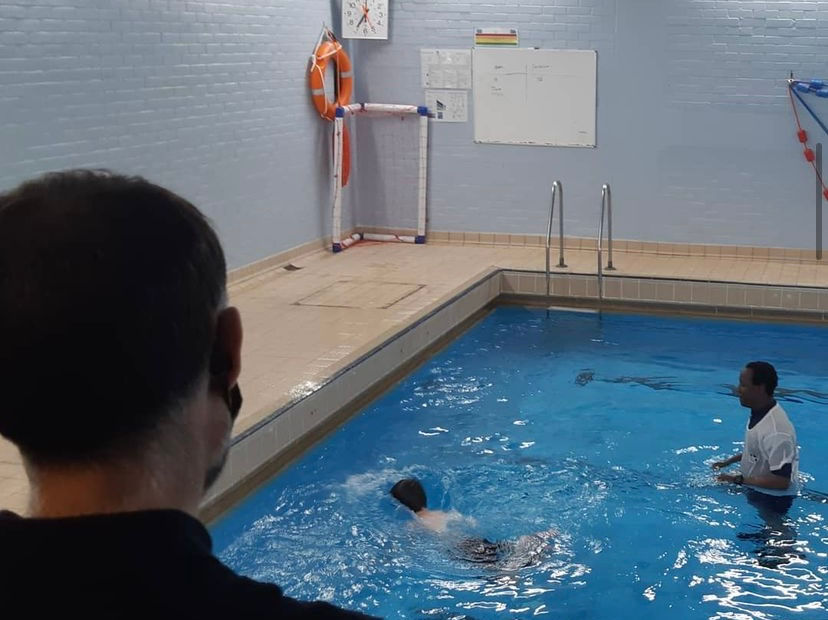
Whilst we were promoting our courses with the STA, we were introduced to an incredibly hard working and inspiring swim school owner and swimming tutor, Annalize Butler. Annalize is the Director of the company Polaris Aquatic Training based in London. Annalize’s company runs swimming lessons and Annalize is one of the only aquatic tutors in the UK of African descent, running vocational courses in swimming instruction and lifesaving. Annalize also runs her own swim school in Wolverhampton, B.O.S.S. (Black Owned Swim School).
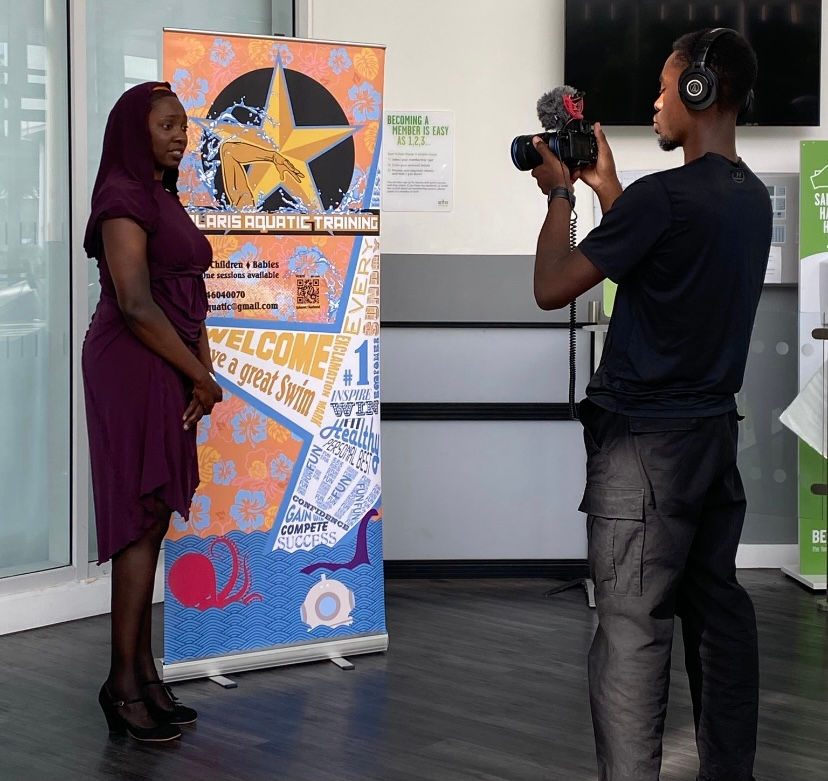
Annalize Butler, founder of Polaris Aquatic Training launching the Grenfell Swim Project
“My passion stems from the injustice that has been so prevalent in this industry for the longest time. I have a very early memory of swimming with my entire family as a child. My family have memories of me teaching them to swim as children and now I am the first swimming teacher for their children. It’s very concerning to hear the repetition of barriers and shared experiences that collectively, although unknowingly for some, have been the cause of a lack of representation, action, or active change for many people who would like to swim or have been discouraged from swimming” Annalize told us. Annalize goes on to say “B.O.S.S (Black Owned Swim School) occupies a space in the company that has centred on my wanting to bridge the disparity of social targeting in sport. B.O.S.S has established and met the needs of members who have not been effectively, socially qualified for swimming participation (in the UK) and the impact is huge.”
One project Annalize has just got off the ground, having taken two years of determination and hard work, is the Grenfell Family Swim initiative, giving free swimming sessions to those within a half mile radius of the centre and Grenfell tower. On June 17th 2017, a fire broke out in the 24 storey Grenfell Tower block of flats in Kensington, London causing 72 deaths and over 70 injuries. It was the worst UK residential fire since the 2ndworld war. This was mainly due to some cheap cladding that was used that did not comply with regulations and went up in flames very quickly. This cladding was used not only to make more profit for the developers, but because the richer people in the area wanted the tower blocks to look ‘nicer’. Kensington and Chelsea is London’s 2nd most expensive borough after Westminster. However, there is still a large number of people living there in poverty, many from the black community.
Next door to the Grenfell tower is Better’s Kensington leisure centre. A new sports centre with a couple of swimming pools. Annalize, who started teaching her family members to swim when she was still a child, stated “The Grenfell initiative has been a pinnacle moment in my career. I was teaching full time in Westway and at the KLC, and was almost at the point of quitting teaching with all that had gone on. The dichotomy of training the children of parents in private swimming lessons that fled the responsibility as governors, chancellors, etc and the conversations split between the ‘poor’ and ‘minority’ class was heavy. The recovery effort was all ‘part of the process’ at the time, but when a chance to develop a community engagement program came around, it was a referral that got me to apply and be successfully elected for the delivery by the constituents and governors of RBKC (Royal borough of Kensington and Chelsea).
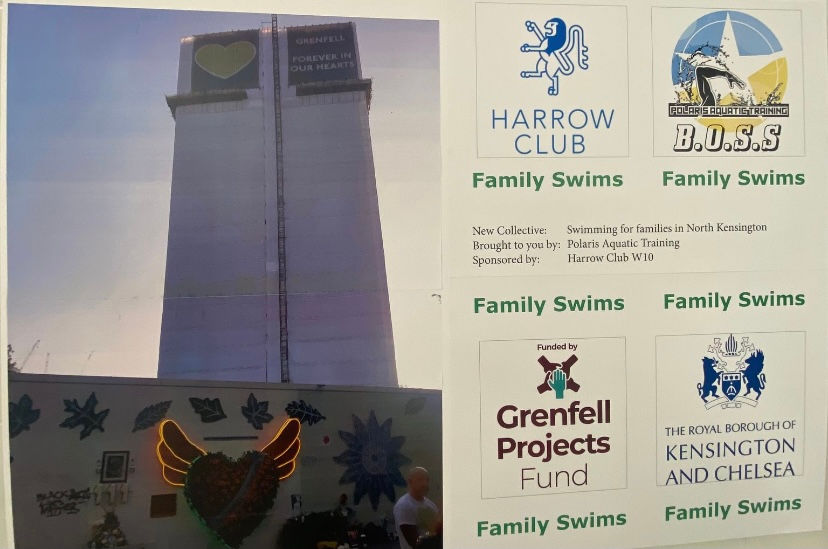
On one side the referral was positive, a chance for me to really do something impactful and representative. On the other hand, it was a greedy opportunity to make additional income for the pool management team. The results created a difficult battle dealing with being gazumped in order for another organisation to deliver their new project in my place. The parameters of the Grenfell Project Fund (GPF) stipulated that the delivery must sit within the North Kensington area and subsequently I had to be persistent to gain space in the local borough community pool so not to be left without a space to run the Grenfell charitable event. You can imagine, then, why I was so grateful after gaining access to the local community pool after more than 2 years of discussion. The ongoing work is to get the space sponsored, since the building belongs to RBKC and the operating company is a tier one sponsor who have funded activities for children in the local community, as long as they qualify with certain credentials.”
Aquabatix was delighted to be invited along to the launch of the Grenfell Family Swim project and will be running a free taster session soon as well as gifting access to some of the instructors to take our artistic swimming online courses, so they can confidently teach these skills to the Grenfell community and hopefully more and more people as they progress through their careers. You can follow up on these sessions on the Polaris Aquatic instagram and also on our Artistic Swimming Courses instagram account here.
Another area we were keen to assist with was in the development of a young instructor called Kejai. Kejai, who has just turned 17, achieved her first formal STA award in swimming teaching in September 2020. Kejai was unable to gain any GCSEs due to the COVID-19 pandemic and her school closing down. Annalize said “I took the opportunity during lockdown to reach out to people of African descent about the importance of understanding how to swim. The publicity relating to lack of education, risk of death, lack of access to facilities, drowning rates, etc had motivated me to make an effective change. The success of the pilot had over 100 families attending in just one month. Kejai shone when she choreographed a synchronised swimming routine, taking heed of her previous swimming training and a love of dance and music. When Keisha, Kejai’s mother, saw the inspiration that Kejai picked up from working with me for a short time, she asked me to mentor Kejai”.
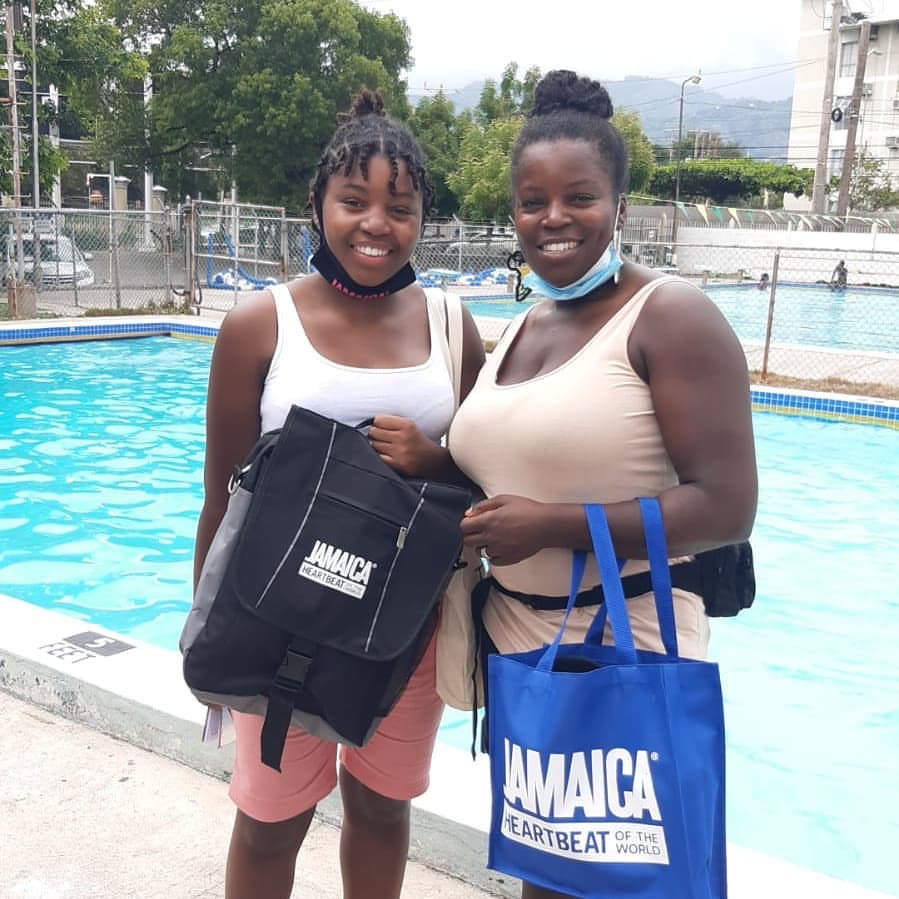
Aquabatix met Kejai on a zoom call, to find out more about herself and her love for the pool and artistic swimming. Kejai mentioned that she became very aware that she was different, the only kid trying out synchro who was a POC, and she never saw anyone else that looked like her doing it, which she found demotivating.
Kejai was about to embark on a trip to Jamaica, which Annalize suggested could double up as a work placement too. Aquabatix were able to connect Kejai and Annalize to the Jamaican national synchro team to help with this. Aquabatix gifted Kejai our two online coruses to learn to teach artistic swimming. Whilst Kejai already knew many of the skills, our courses helped her expand on her current knowledge and expertise from having participated in artistic swimming to learning how to teach them.

Once COVID restrictions allowed, Annalize states: “Kejai could pursue a coaching experience and gain a new network with some really wonderful people”.
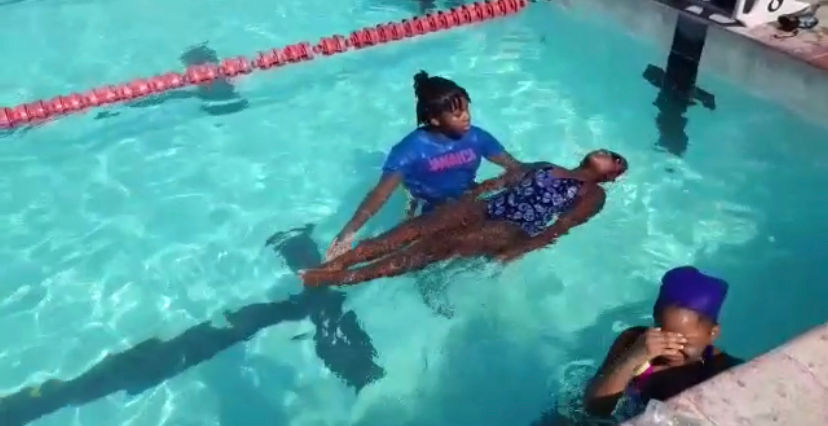
Kejai has been working with both children and adults over in Jamaica, teaching them the basic skills of artistic swimming, and looks to be having a wonderful experience, not only growing professionally but also personally. This initiative and Kejai has also helped Aquabatix spread the skills and fun of learning artistic swimming to another country. To follow Kejai’s progress., keep tuned in to Polaris aquatic instagram and Artistic Swimming Courses instagram.

The Future:
There is still a long way to go to achieving equality in everyday life. In aquatics, small steps are being taken, and thankfully there are now Olympic athletes from the black community representing their countries and winning medals on the Olympic stage. Simone Manuel was the first African American to win an Olympic gold in swimming only five years ago, and with Jamaican swimmer Alia Atkinson, and British hopefuls Alice Dearing and diver Yona Knight-Wisdom all having qualified for Tokyo, there will be more representation of the BAME community in the pool for young children to aspire to.

In 2020, Beyonce showcased some young black synchronised swimmers in her ‘Black is King’ track ‘Mood 4 Eva”. Beyonce has a huge fan base and used her global platform to show millions of people synchronised swimming being performed by black swimmers. One lady called Gretchen A Campbell said “the way I squealed when I saw all brown girls doing this synchronized swimming routine. I’ve always loved synchronized swimming but I’ve never seen anyone that looked like me doing it”. In a few years we will hopefully see more and more black aquatic athletes, performers, teachers, choreographers, administrative staff, swim school owners and tutors thanks to the efforts, passion and determination of people such as Annalize, Ed, Seren, Alice, Danielle, Kejai and even the Queen herself, Beyonce.

To follow Polaris Aquatic Training progress with the Grenfell Family Swims project, click on their instagram here, and get in touch with Annalize if you can offer any support: polarisaquatic@gmail.com or visit their website www.polarisaquatictraining.com


Comments